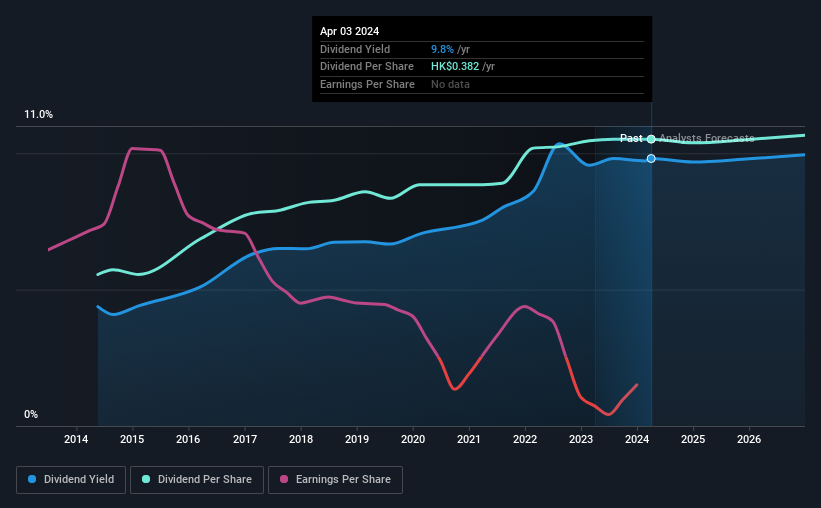PCCW (HKG:8) Will Pay A Dividend Of HK$0.2848

The board of PCCW Limited (HKG:8) has announced that it will pay a dividend on the 21st of June, with investors receiving HK$0.2848 per share. Based on this payment, the dividend yield on the company's stock will be 9.8%, which is an attractive boost to shareholder returns.
View our latest analysis for PCCW
PCCW Doesn't Earn Enough To Cover Its Payments
We like to see robust dividend yields, but that doesn't matter if the payment isn't sustainable. Even though PCCW isn't generating a profit, it is generating healthy free cash flows that easily cover the dividend. We generally think that cash flow is more important than accounting measures of profit, so we are fairly comfortable with the dividend at this level.
Over the next year, EPS is forecast to grow rapidly. If recent patterns in the dividend continues, we would start to get a bit worried, with the payout ratio possibly reaching 158%.

PCCW Has A Solid Track Record
The company has been paying a dividend for a long time, and it has been quite stable which gives us confidence in the future dividend potential. The dividend has gone from an annual total of HK$0.202 in 2014 to the most recent total annual payment of HK$0.383. This implies that the company grew its distributions at a yearly rate of about 6.6% over that duration. The growth of the dividend has been pretty reliable, so we think this can offer investors some nice additional income in their portfolio.
Dividend Growth Potential Is Shaky
Some investors will be chomping at the bit to buy some of the company's stock based on its dividend history. However, initial appearances might be deceiving. PCCW's earnings per share has shrunk at 50% a year over the past five years. Such rapid declines definitely have the potential to constrain dividend payments if the trend continues into the future. However, the next year is actually looking up, with earnings set to rise. We would just wait until it becomes a pattern before getting too excited.
Our Thoughts On PCCW's Dividend
In summary, while it's good to see that the dividend hasn't been cut, we are a bit cautious about PCCW's payments, as there could be some issues with sustaining them into the future. The company has been bring in plenty of cash to cover the dividend, but we don't necessarily think that makes it a great dividend stock. We don't think PCCW is a great stock to add to your portfolio if income is your focus.
Companies possessing a stable dividend policy will likely enjoy greater investor interest than those suffering from a more inconsistent approach. At the same time, there are other factors our readers should be conscious of before pouring capital into a stock. Case in point: We've spotted 2 warning signs for PCCW (of which 1 is potentially serious!) you should know about. If you are a dividend investor, you might also want to look at our curated list of high yield dividend stocks.
New: Manage All Your Stock Portfolios in One Place
We've created the ultimate portfolio companion for stock investors, and it's free.
• Connect an unlimited number of Portfolios and see your total in one currency
• Be alerted to new Warning Signs or Risks via email or mobile
• Track the Fair Value of your stocks
Have feedback on this article? Concerned about the content? Get in touch with us directly. Alternatively, email editorial-team (at) simplywallst.com.
This article by Simply Wall St is general in nature. We provide commentary based on historical data and analyst forecasts only using an unbiased methodology and our articles are not intended to be financial advice. It does not constitute a recommendation to buy or sell any stock, and does not take account of your objectives, or your financial situation. We aim to bring you long-term focused analysis driven by fundamental data. Note that our analysis may not factor in the latest price-sensitive company announcements or qualitative material. Simply Wall St has no position in any stocks mentioned.
About SEHK:8
PCCW
Provides telecommunications and related services in Hong Kong, Mainland and other parts of China, Singapore, and internationally.
Undervalued established dividend payer.


